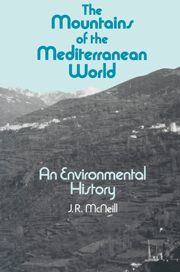Book contents
- Frontmatter
- Contents
- List of Illustrations and Tables
- Preface
- Note on Transliteration
- List of Abbreviations
- 1 The Argument: Ecology, Economy, Shells, and Skeletons
- 2 Mediterranean Mountain Environments
- 3 The Deep History of Mediterranean Landscapes
- 4 Material Life in the Mountain Environment, 1700–1900
- 5 Population, Settlement, and Landscapes
- 6 Political Economy and Mountain Landscapes
- 7 The Changing Landscape since 1800
- 8 Conclusion
- Bibliography
- Index
6 - Political Economy and Mountain Landscapes
Published online by Cambridge University Press: 29 September 2009
- Frontmatter
- Contents
- List of Illustrations and Tables
- Preface
- Note on Transliteration
- List of Abbreviations
- 1 The Argument: Ecology, Economy, Shells, and Skeletons
- 2 Mediterranean Mountain Environments
- 3 The Deep History of Mediterranean Landscapes
- 4 Material Life in the Mountain Environment, 1700–1900
- 5 Population, Settlement, and Landscapes
- 6 Political Economy and Mountain Landscapes
- 7 The Changing Landscape since 1800
- 8 Conclusion
- Bibliography
- Index
Summary
Now in earlier times the world's history had consisted, so to speak, of a series of unrelated episodes, the origins and results of each being as widely separated as their localities, but from this point onward history becomes an organic whole: the affairs of Italy and Africa are connected with those of Asia and Greece, and all events bear a relationship and contribute to a single end.
Polybius (died 118 b.c.)In place of old wants, satisfied by productions of the country, we find new wants, requiring for their satisfaction the products of distant lands and climes. In place of the old local and national seclusions and self-sufficiency, we have intercourse in every direction, universal interdependence of nations.
Marx and Engels, The Communist ManifestoThe industrial revolution changed economic life in corners all over the world. So did the extension and tighter integration of market systems. World trade grew rapidly, and the mountains of the Mediterranean, like many other places, now felt the impact of economic events and trends originating on different continents. Long-distance trade of course had had a long history in the Mediterranean world. Caravans had connected the Mediterranean with China, India, and West Africa for centuries. Ships had made the connection with the Americas since 1492. But the scale of things changed with the worldwide population and economic growth that began in the eighteenth century and hit full stride in the nineteenth.
- Type
- Chapter
- Information
- The Mountains of the Mediterranean World , pp. 221 - 271Publisher: Cambridge University PressPrint publication year: 1992



